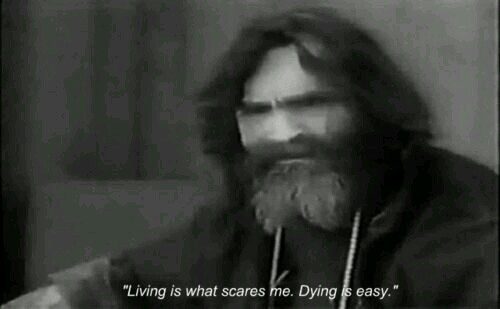
Charles Manson: thought by some to be a genius, thought by many to be a maniac. Only a select few realised that he was both. In his actions relating to the infamous Family killings, Manson almost showed humanity a new way of relating to power, but a poor choice of target disqualify his actions from being considered anarcho-homicidalism.
Much like Adolf Hitler, Manson kept a coterie of devoted followers on account of an extraordinary level of charisma and penchant for giving lectures about the degeneracy into which the outside world had fallen. Also much like Adolf Hitler, Manson had a lot of excellent ideas that lacked execution, with consequences that the world would not forget.
One of the excellent ideas that Manson had was that people ought to rise up and challenge the control system, on account of its incredible corruption and the lies and destruction that it has wrought upon the Earth. Rising up against liars and thieves who have wormed themselves into positions of authority is the basis of anarcho-homicidalism, and no doubt Manson played on natural anarcho-homicidalist sentiments when he persuaded Watson et al. to do what they did.
Nobody can stand in judgement, they can play like they’re standing in judgement. They can play like they stand in judgement and take you off and control the masses, with your human body. They can lock you up in penitentiaries and cages and put you in crosses like they did in the past, but it doesn’t amount to anything. What they’re doing is, they’re only persecuting a reflection of themselves. They’re persecuting what they can’t stand to look at in themselves, the truth. – Charles Manson
Some might argue that Manson was an anarcho-homicidalist, on account of that much of his stated ideology was anarchic, and so the homicidal actions of the Family were also anarchism. It could indeed be argued that the Family actions were anarchic, because behaving in that manner is demonstrating very clearly that one has no rulers, but actions only constitute legitimate anarcho-homicidalism if they are conducted against someone making an attempt to enslave another.
It’s not really fair to target members of the cultural elite on that basis alone, for the reason that they are not the ones holding the reins of power. Sharon Tate was an actress – an influential position admittedly – but no-one took orders from her. She didn’t threaten anyone into coercion; she didn’t try to enslave anyone. She was just a pretty face that people paid money to look at for a few hours.
There was perhaps an element of jealousy in Manson’s selection of target, in that he had found it difficult to break into Los Angeles cultural circles, and so chose to target those who had. Such motivations cannot be considered anarcho-homicidal in any real sense, because they didn’t target anyone who held real coercive power, and were not motivated by the ideal of liberation.
This absence of coercive power meant that the people the Manson Family killed were not aggressors in any real sense, and therefore killing them could not be justified in self defence.
If Manson had targeted politicians instead, things would be very different. America was embroiled in the Vietnam War in 1969, and the Government was drafting young men to fight it without their consent, on pain of imprisonment. Killing any prominent warhawk or supporter of the Vietnam War would have been a legitimate act of anarcho-homicidalism, and would have been much more effective than abusing the draftees when they returned.
Charles Manson and his Family had more or less the right idea; their major error lay in the selection of a target that was not directly trying to enslave them.
